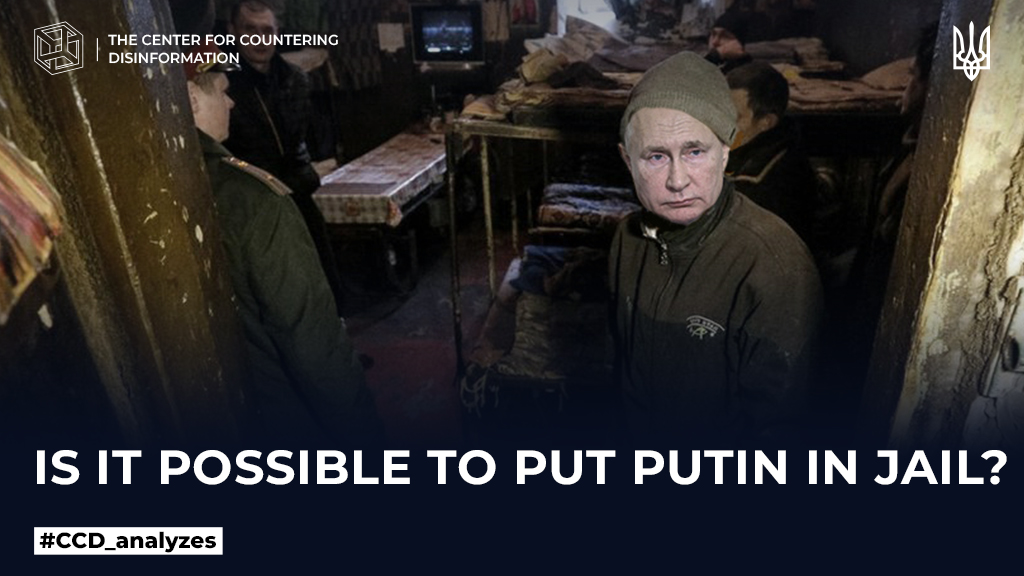The decision of the International Criminal Court (ICC) to issue a warrant for putin’s arrest caused a stir in the world, in Ukraine and in russia itself. For the first time in recent history, the leader of a nuclear-armed country is facing international criminal liability on charges of war crimes. However, the question of whether the full members of the Rome Statute will fulfill their obligation to cooperate with the ICC remains open and highly debatable. The opinions of international and Ukrainian experts on this matter differ radically. Some are sure that the chances of arresting putin are slim, others think that the ICC case has a real prospect – everything will end with the arrest and prosecution of the russian leader.
As you know, even before the decision of the ICC, Kyiv began promoting the idea of a special tribunal for russian war criminals. He should be given jurisdiction to investigate only one crime of aggression, which gives hope for very speedy justice. It is planned to take the definition of the crime of aggression and its accomplices by the Rome Statute as the basis of the powers of the future tribunal. It specifies that the defendants in the case of aggression should be persons who carried out “planning, preparation, resolution or execution of an act of aggression” and had “the opportunity to actually exercise control over the political or military actions of the state or to direct them.” This approach gives grounds to add to the list of accused, in addition to putin, high-ranking officials of the russian federation and belarus.
To implement the idea of a special tribunal, Ukraine and its Western partners have developed three models, each of which has both advantages and disadvantages. The first model provides for the creation of a special tribunal by decision of the UN Security Council. The second model is the creation of a tribunal based on a multilateral open international treaty. And the third model is the so-called hybrid tribunal, created on the basis of Ukrainian law with the involvement of international structures to analyze its activities.
What arguments are put forward by supporters and skeptics of putin’s judicial prospects?
Arguments of pessimists.
1. The main argument of the pessimists is that one of the unwritten principles of international law is the immunity from criminal prosecution of the so-called “three” – current heads of state, prime ministers and heads of foreign affairs. It is believed that during the performance of their powers, these three officials have absolute immunity for law enforcement officers of other states.
2. The attempt to create a special tribunal by the decision of the UN Security Council will be immediately blocked by the ambassador of russia, as a permanent member of the Security Council.
3. The option of creating a special tribunal through a so-called multilateral treaty provides: if an international treaty has been signed and ratified by more than 60 countries, it is recognized as expressing the opinion of the world community, even if this treaty has not been approved by the UN General Assembly or the UN Security Council. However, the ratification of such a treaty will be delayed indefinitely, negating all the advantages of creating a tribunal. In addition, a number of Western countries are afraid that then russia and China may initiate the creation of a symmetrical “anti-American” tribunal.
4. The idea of a “hybrid tribunal”, i.e. a court that will act in accordance with the legislation of Ukraine, but abroad, and its judges will be Ukrainian and international judges at the same time, is currently not supported by the Ukrainian authorities. The President’s office publicly declared the inadmissibility of the idea of creating such a tool to investigate the crime of russian aggression, because it turns the process of international condemnation of russian aggression into an ordinary judicial review of the interstate conflict between Ukraine and russia.
Arguments of optimists.
1. The principle of “three” immunity is not recorded in any official documents. Moreover, in the Rome Statute, as the basic document of the ICC, which has been ratified by 123 states of the world, there is a separate article No. 27, which specifies: this court can prosecute even current heads of state and any other officials who have committed international crimes.
2. A potential way to overcome russia’s veto in the UN Security Council could be its exclusion from the UN and, accordingly, from the Security Council, but this is an option for the future. The creation of a special tribunal by the decision of the UN General Assembly is more achievable. According to the regulations of the UN General Assembly, such a decision can be considered “important” if 2/3 of the states present at the meeting (more than 100) vote for it, and this is quite achievable if the USA and key EU members join the lobbying.
3. Despite Ukraine’s disagreement, the idea of a “hybrid tribunal” has not been removed from discussion by the European Commission, because for Ukraine it eliminates the problem of immunity of the russian leadership, accelerates the speed of proceedings and provides the possibility of conviction in absentia.
❗️Therefore, significant results in bringing putin to justice should be expected after the reform of international criminal law and the elimination of the specified legal gaps.










